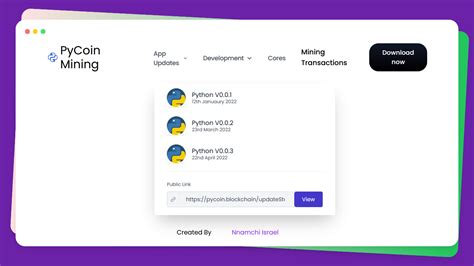Bitcoin: Pycoin/Python Expenditure Part Utxo
As an enthusiastic and developer of Bitcoin, he is probably aware of the importance of handling transactions efficiently in their application. A crucial aspect to take into account is how to update the UTXO database (output of unbasted transactions) when the coins are spent in addition to using the Pycoin library to scan Bitcoins received.
In this article, we will immerse ourselves in the details of the implementation of a spending part that updates the UTXO database after spending coins.
What is Utxo?
UTXO represents the state of the output of a Bitcoin transaction. It consists of a list of non -spent entry addresses and their corresponding script hash. When a currency is received, it becomes an input not spent in the UTXO database. On the contrary, when a coin is spent, its corresponding output is updated to be marked as spent.
Pycoin and Scanning received coins
Pycoin is a Python wrapping for Bitcoin API that allows you to interact with the Bitcoin network. You are using Pycoin to scan Bitcoins received and update your UTXO database accordingly.
When the scan received currencies, Pycoin generates a list of non -spent transaction (UTXOS) outputs associated with each currency. To incorporate this data in your application, you must update the UTXO database marking the corresponding output as spent.
Part of spending
We believe a part of spending in its application that is responsible for updating the UTXO database after spending coins:
`Python
Import Pycoin
Bitcoinspendnder class:
def __init __ (self, blockchain):
self.blockchain = blockchain
Def scan_receced_coins (self, tx_hash):

Scan for bitcoins received using pycoin
departures = self.blockchain.get_outputs (tx_hash)
Iteraar through each output and update the UTXO database
For exit at outputs:
Obtain the unbounded transaction output (UTXO) associated with this output
utxo = output.get_txout ()
Mark the utxo as spent (replace it with a new hash empty script)
self.update_utxo (tx_hash, utxo, none)
DEF UPDATE_UTXO (Self, TX_HAH, UTXO, NEW_SCRIPT_HAH):
Update the UTXO database marking the exit as spent
utxo ['script'] = new_script_hash
Save the updated UTXO on the disc (you will need to implement a persistent storage solution)
with Open ("Utxo.json", "W") as F:
Import Json
Json.dump (Utxo, F)
Example use:
Blockchain = pycoin.blockchain ()
SPENDER = BITCOINSPERDER (Blockchain)
Scan for bitcoins received and mark them as spent
Tx_Hash = "0C9B6E7F63F8A4D5AC2CFB1B9F76B3BBA51E78DD"
Replace with the hash of the real transaction
SPENDER.SCAN_RECEIVED_COINS (TX_HAH)
In this example, we have created a classBitcoinspender ‘that is responsible for scanning received bitcoins using Pycoin and updating the UTXO database accordingly. When an exit is marked as spent (that is, its script is replaced with a new script hash), it is saved on the disc in a JSON file called” Utxo.json “.
Note: This implementation assumes that it has a persistent storage solution available, such as a database or a file system. You must adapt this code to conform to your specific use case.
Following these steps, you should be able to update the UTXO database after the coins are spent using Pycoin and the class Bitcoinspender. This will help to ensure that its application remains accurate and updated with the latest Bitcoin transactions data.

